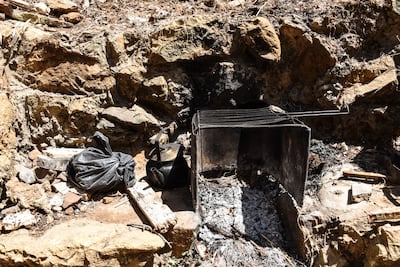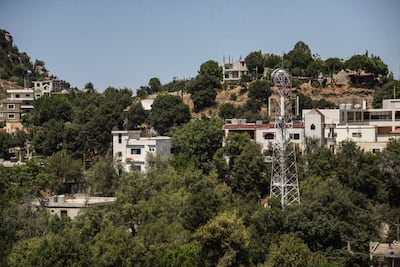In a small village in the isolated rural region of Akkar, north Lebanon, Rweida Mohammed, 36, cooks for her family on an open fire outside and heats water to wash their clothes by hand.
Sales of gas cylinders stopped last month and bread disappeared off supermarket shelves five days ago, she said.
The small amount of bread on the kitchen table was salvaged from relatives. The fridge is turned off and empty, save for a few tomatoes.
The mother of young triplets is close to despair. She regularly walks to a nearby town to ask the Ministry of Social Affairs for help, but has received no response. “I must have been 100 times by now,” she said.
Lebanon’s protracted financial crisis, which started in 2019, took a turn for the worse this week. The country’s electricity is produced by burning fuel that it can barely afford to import any more. Without electricity, companies, including bakeries, cannot operate normally.
North Lebanon, where poverty is most prevalent, has been hit especially hard.
Look at the people outside, they’re like hungry dogs
Mohammed Danaj,
bakery worker in Tripoli
In Tripoli, Lebanon’s second biggest city, customers waited for hours in the sun on Thursday to buy a maximum of four packs of bread outside Tarek Al Ridani bakery.
Four packs of bread will last two days for Mohammed Melhem’s family of eight. They cost Mr Melhem, 55, a Syrian refugee, a fifth of the monthly allowance he receives from the UN.
In his neighbourhood, El Qobbeh, bakeries do not sell more than one pack of bread to each client, he said.
The price of bread, which is fixed by the government, has more than tripled since the beginning of the financial crisis, as the value of the local currency tumbled. Each bag weighs close to a kilogram and is stacked with round, white traditional Arabic flatbread.
The shortage of bread is acutely felt in a country where it is ritually served with each meal.
“Bread is a medium – if you don’t have a spoon, you eat with bread. It is part of people’s lives,” said Mohammad Hazim, a retired mechanical engineer and former mayor of the town of Hrar in Akkar. “If there is no bread, there is no life."
Hrar, nestled in the mountains above Tripoli, relies on bread produced along the coast and brought by lorry, Mr Hazim said. But with little or no fuel, deliveries stopped.
Mr Hazim calls this “the fuel war”.
It has spread across the country. In the town of Sawfar, about 140 kilometres south, residents recently broke into a bakery to steal bread.
“They were afraid it would close because it didn’t have enough fuel to operate 24/7 like before,” said Sawfar’s Mayor Kamal Shaya.
In Akkar, vigilante groups have been stopping vehicles carrying fuel they suspect is being smuggled to neighbouring Syria.
Imad Kreidieh, chairman of state telecoms company Ogero, said people attacked tankers bringing fuel to run its private generators, causing cuts to the internet in the region.
"I have been forced to cut services due to a lack of fuel," he told The National.
But he hopes the situation is temporary. "It’s inconceivable [to think] that we are heading towards a total blackout. Considering a Lebanon without power is surreal," he said.
In Tripoli, bakers do not know when they will be able to work again.
Mohammed Danaj, an employee at Tarek Al Ridani bakery, said on Thursday they bought flour on the black market at nearly four times the official price.
Several bags weighing close to two tonnes were stacked in a back room. That was all that was left at the time, just enough to make bread until 4pm that day. Then they would close indefinitely.
“Look at the people outside, they’re like hungry dogs,” Mr Danaj said.
“People line up at the petrol station to be humiliated. Here they are humiliated too. They want more bread for their families.”
The bakery is opposite a closed petrol station. A queue of cars snaked around the block as motorists waited for it to open again. Drivers can wait an entire day for fuel, causing traffic jams.
Although Lebanon is at the peak of its summer season, many already worry about next winter. Every year, snow falls on Lebanese mountains and locals rely on fuel for heat.
“See those oak trees?” Mr Hazim asked, pointing at a cluster of trees close to his house on top of a hill near a shrine. “Nobody cuts them because they’re afraid of God. But they will if their survival depends on it.”
COMPANY%20PROFILE%20
%3Cp%3E%3Cstrong%3EName%3A%3C%2Fstrong%3E%20Haltia.ai%0D%3Cbr%3E%3Cstrong%3EStarted%3A%3C%2Fstrong%3E%202023%0D%3Cbr%3E%3Cstrong%3ECo-founders%3A%3C%2Fstrong%3E%20Arto%20Bendiken%20and%20Talal%20Thabet%0D%3Cbr%3E%3Cstrong%3EBased%3A%3C%2Fstrong%3E%20Dubai%2C%20UAE%0D%3Cbr%3E%3Cstrong%3EIndustry%3A%3C%2Fstrong%3E%20AI%0D%3Cbr%3E%3Cstrong%3ENumber%20of%20employees%3A%3C%2Fstrong%3E%2041%0D%3Cbr%3E%3Cstrong%3EFunding%3A%3C%2Fstrong%3E%20About%20%241.7%20million%0D%3Cbr%3E%3Cstrong%3EInvestors%3A%3C%2Fstrong%3E%20Self%2C%20family%20and%20friends%26nbsp%3B%3C%2Fp%3E%0A
The specs
Engine: 4.0-litre flat-six
Torque: 450Nm at 6,100rpm
Transmission: 7-speed PDK auto or 6-speed manual
Fuel economy, combined: 13.8L/100km
On sale: Available to order now
ESSENTIALS
The flights
Emirates flies from Dubai to Phnom Penh via Yangon from Dh2,700 return including taxes. Cambodia Bayon Airlines and Cambodia Angkor Air offer return flights from Phnom Penh to Siem Reap from Dh250 return including taxes. The flight takes about 45 minutes.
The hotels
Rooms at the Raffles Le Royal in Phnom Penh cost from $225 (Dh826) per night including taxes. Rooms at the Grand Hotel d'Angkor cost from $261 (Dh960) per night including taxes.
The tours
A cyclo architecture tour of Phnom Penh costs from $20 (Dh75) per person for about three hours, with Khmer Architecture Tours. Tailor-made tours of all of Cambodia, or sites like Angkor alone, can be arranged by About Asia Travel. Emirates Holidays also offers packages.
COMPANY PROFILE
Name: Akeed
Based: Muscat
Launch year: 2018
Number of employees: 40
Sector: Online food delivery
Funding: Raised $3.2m since inception
F1 The Movie
Starring: Brad Pitt, Damson Idris, Kerry Condon, Javier Bardem
Director: Joseph Kosinski
Rating: 4/5
Points about the fast fashion industry Celine Hajjar wants everyone to know
- Fast fashion is responsible for up to 10 per cent of global carbon emissions
- Fast fashion is responsible for 24 per cent of the world's insecticides
- Synthetic fibres that make up the average garment can take hundreds of years to biodegrade
- Fast fashion labour workers make 80 per cent less than the required salary to live
- 27 million fast fashion workers worldwide suffer from work-related illnesses and diseases
- Hundreds of thousands of fast fashion labourers work without rights or protection and 80 per cent of them are women
The specs
Engine: 2.7-litre 4-cylinder Turbomax
Power: 310hp
Torque: 583Nm
Transmission: 8-speed automatic
Price: From Dh192,500
On sale: Now
The specs
Engine: 77.4kW all-wheel-drive dual motor
Power: 320bhp
Torque: 605Nm
Transmission: Single-speed automatic
Price: From Dh219,000
On sale: Now
The burning issue
The internal combustion engine is facing a watershed moment – major manufacturer Volvo is to stop producing petroleum-powered vehicles by 2021 and countries in Europe, including the UK, have vowed to ban their sale before 2040. The National takes a look at the story of one of the most successful technologies of the last 100 years and how it has impacted life in the UAE.
Read part four: an affection for classic cars lives on
Read part three: the age of the electric vehicle begins
Read part one: how cars came to the UAE
UAE currency: the story behind the money in your pockets
Results
International 4, United States 1
Justin Thomas and Tiger Woods (US) beat Marc Leishman and Joaquin Niemann (International) 4 and 3.
Adam Hadwin and Sungjae Im (International) beat Xander Schauffele and Patrick Cantlay (US) 2 up.
Adam Scott and Byeong Hun An (International) beat Bryson DeChambeau and Tony Finau (US) 2 and 1.
Hideki Matsuyama and C.T. Pan (International) beat Webb Simpson and Patrick Reed (US) 1 up.
Abraham Ancer and Louis Oosthuizen (International) beat Dustin Johnson and Gary Woodland (US) 4 and 3.
Race card
6.30pm: Maiden (TB) Dh 82,500 (Dirt) 1.600m
7.05pm: Maiden (TB) Dh 82,500 (D) 2,000m
7.50pm: Handicap (TB) Dh 82,500 (D) 1,600m
8.15pm: The Garhoud Sprint Listed (TB) Dh 132,500 (D) 1,200m
8.50pm: The Entisar Listed (TB) Dh 132,500 (D) 2,000m
9.25pm: Conditions (TB) Dh 120,000 (D) 1,400m
COMPANY%20PROFILE
%3Cp%3E%3Cstrong%3EName%3A%20%3C%2Fstrong%3EKinetic%207%3Cbr%3E%3Cstrong%3EStarted%3A%3C%2Fstrong%3E%202018%3Cbr%3E%3Cstrong%3EFounder%3A%3C%2Fstrong%3E%20Rick%20Parish%3Cbr%3E%3Cstrong%3EBased%3A%3C%2Fstrong%3E%20Abu%20Dhabi%2C%20UAE%3Cbr%3E%3Cstrong%3EIndustry%3A%3C%2Fstrong%3E%20Clean%20cooking%3Cbr%3E%3Cstrong%3EFunding%3A%3C%2Fstrong%3E%20%2410%20million%3Cbr%3E%3Cstrong%3EInvestors%3A%3C%2Fstrong%3E%20Self-funded%3C%2Fp%3E%0A
Episode list:
Ep1: A recovery like no other- the unevenness of the economic recovery
Ep2: PCR and jobs - the future of work - new trends and challenges
Ep3: The recovery and global trade disruptions - globalisation post-pandemic
Ep4: Inflation- services and goods - debt risks
Ep5: Travel and tourism


















